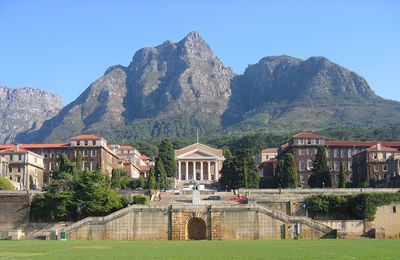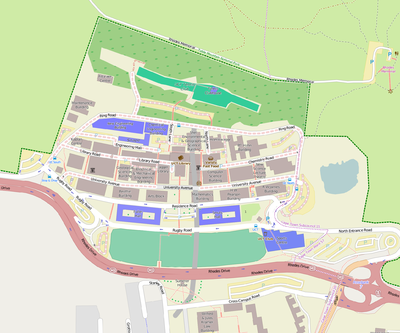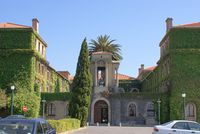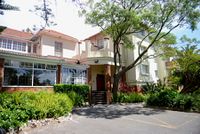DebConf16/Bids/Cape Town/Venues/UCT ChemEng
[edit] Location
We propose hosting the conference within the New Engineering Building, and the adjoined Chemical Engineering Building, in University of Cape Town (UCT)'s Upper Campus. These are modern buildings, towards to top, South West corner of the upper campus.
UCT Upper Campus nestled in the East slope of Devil's Peak - a central location, between the city centre, airport, and suburbs. The campus is surrounded on three sides by Table Mountain National Park. There are many hiking, running, and mountain biking routes from the campus.
The University is centred around upper campus, sprawling down the hill into administrative buildings and residences in the Middle and Lower campuses. Below lower campus is Main Road, with several restaurants, bars, and public transport (trains and busses). Through the middle (dividing upper and middle campuses) runs Rhodes Drive (M3) a major artery of the city.
[edit] Conference Facilities
[edit] How much does it cost to rent these facilities?
We can get venues within the university for no cost. The conference request has been supported by the Engineering Faculty, and approved by the Deputy Vice Chancellor's office.
[edit] How far away are the locations from each other? (auditoriums, hacklabs, restaurant, sleeping quarters, info desk)
The sleeping quarters (university residences) would be a short, 5 minute walk down the hill from the conference venue. Auditoriums, hacklabs, and front desk would all be short walking distance from each other, within the New Engineering Building, and the adjoined Chemical Engineering Building. If necessary we'd overflow into lecture theatres in nearby buildings, such an Snape, or Menzies, all neighbouring each other. Plenaries would be held either in the next door Snape building, Menzies, or down the hill in Leslie Social Sciences.
Transport: Jammie Shuttles
OpenStreetmap coverage of Upper Campus. Upper Campus map.
[edit] What kind of places are available suitable for hacklabs, workshops, BoFs and talks?
The Chemical Engineering buildings are full of open areas with tables and couches. This would be usable as hack space. There are also board rooms (20 people) and classrooms (30 people) in the building that would make good hack spaces.
There are 2 100-seat lecture venues within the Chemical Engineering buildings, and larger theatres in nearby buildings. Snape and Menzies have 200-seat lecture theatres, and Leslie has a 348 seat venue (as well as smaller ones).
For BoFs we could use any classrooms we aren't using for lecture theatres and hacklabs, or possibly the small (60 seat) lecture theaters in Snape.
[edit] How flexibly can we be accommodated?
The university has many (dozens of) lecture theatre on upper campus, and hundreds of classrooms. Because we are during holidays, we have a lot of freedom in choosing them — we should be able to pick and choose. We would probably want to restrict ourselves to nearby buildings, but that still leaves an enormous amount of freedom.
[edit] Can smaller auditoriums be merged into a bigger one?
No. The university's rooms are all fixed size.
[edit] Are tables/chairs fixed, or can we arrange them to fit more people/give more room to the people that we need?
The large lecture theatres all have fixed seating and desks. Most are in a semi-circular, fishbowl shape. Snape LT1 being the exception — it has straight rows of seats.
The classrooms provide more freedom to rearrange things, but there aren't many large class rooms.
[edit] Is the venue ready for handicapped people?
The location, on the side of a mountain, isn't the most amenable to accessibility. There are many staircases, and the older buildings don't all have elevators.
However, all the buildings we are looking at are wheelchair friendly - there are elevators between floors. Many of the buildings are all inter-connected without steps, either at ground level or walkways. All the university's buildings are road-accessible (possibly behind access controlled booms), and wheelchair bound students can transported by vehicle between buildings.
The university's disability service has a map describing these connections, and other disability features. And a written description, too. These are, unfortunately a little out of date. It pre-dates the New Engineering Building, and the alterations to Snape. However, these have been built to a high accessibility standard, and the Disability Services assures us they are fully accessible.
There are railings around all high edges, making it navigable for the sight impaired. Hazardous areas of the building are behind closed doors or glass walls.
The Disability Service provides accessible transport during the university vacation, to anyone who has business on UCT's campuses.
[edit] Are there people with experience handling handicapped people, who checked that?
There aren't any on the team, however the University's disability's service is available by phone or e-mail.
[edit] Are blueprints with exact distances available to us?
These should be available from the Properties and Services department, but we haven't requested any, yet.
Low-resolution plans of all the buildings are available from the Information and Communication Technology Services (ICTS)'s wireless network maps.
[edit] What kind of audio equipment is already present at the auditoriums?
Every lecture theatre has a (not particularly amazing) PA system built in. We'd be able to feed it from the Video Team equipment.
Each lecture theatre has a locable cabinet containing (usually):
- a PA amplifier
- a wireless microphone or two (usually lavalier)
- VHS/DVD player
- a VGA card for connecting a laptop to the projector.
Sometimes there is a lectern with an attached stationary microphone, and possibly a built-in PC.
We'd probably want to use our own microphones, mixers, and computers, feeding the lecture theatre's PA system from our mixing desk.
[edit] Will the hacklabs be allowed to stay open 24x7?
Yes, the university has 24hr security, and swipe-card access to all buildings. We assume that we'd get every attendee issued with a temporary access card.
[edit] What kind of security will be there?
The university has a security contractor. There are guards regularly patrolling, and the outside areas are covered by CCTV. There's a control room in Leslie Social Sciences, nearby, which is the hub of after-hours security.
[edit] Are there any limitations regarding the consumptions of food / alcohol?
We are able to use outside caterers, even in the University Residence's dining hall.
If we are not providing alcohol, there shouldn't be any issue. When alcohol is provided, the university requires an (internal) license. This is usually, mostly to prevent drunken driving, and avoid over-consumption.
There is a pub on campus (in the Sports Centre). Its usual closing time is 9pm, but could be kept open later, if we arrange it.
The Tennis Club, (above upper campus) is available for hire, and is often used for parties serving alcohol.
[edit] How far is it to the nearest convenience stores / all-night restaurants?
15-20 minutes walk down the hill to Main Road, there are restaurants, bars and 2 shopping centres.
[edit] Special (server) rooms
As we have a faculty sysadmin on the team, we could potentially use the Chemical Engineering departmental server room, rather than have our own server room. The server room has a couple of racks of server equipment installed, and shelf space for free standing machines. We'd be able to host a couple of machines on the shelves.
The room has N+1 air cooling redundancy, and a three-phase online UPS. The building has a backup generator set. It is all well below capacity, and we could host several machines, without any trouble.
Alternatively, if we wanted to do our own (for flexibility) we could use a small, lockable classroom for the purpose. UPS power is available in some rooms, and there is central air conditioning plant.
[edit] Food
[edit] How much are the meals per person per day?
We haven't settled on a caterer, yet. The residences are catered for by Fedics (a high-volume outsourced caterer) during term time. We could use their services, but to get less institutional meals, we have to look elsewhere. University catering for personal bookings include the room booking and is R 325.00 for three meals (2015 prices)
We have quotes (in git) for ~ R 375 (€27) pppd from outside caterers. This is probably on the high end of what is available, for that price we expect interesting, fairly high quality food, with options to meet everyone's dietary needs and preferences. Lower cost options should be available, too.
We will probably go for buffet-style service, but table service would be possible.
There are many food sellers and dining areas on the campus. Most close over the vacation, but we could encourage a few of them to open for the conference, and provide our food.
[edit] Is the eating place near the talks place / the hacklabs
The dining area isn't decided yet. There are a variety of options:
- Fuller Hall (the residence) has a dining hall. This may be the best place to have breakfast, or even all meals.
- Leslie Social Sciences has a lot of open, unstructured space, where we could set up buffet and tables. There are already some tables for eating at, as there are a couple of cafeterias in the building.
- Molly Blackburn Hall is an open hall, often used for functions, it even has attached kitchens.
- The Food Court has many tables, and we could set up our buffet to one side.
- The UCT Club caters for conferences, in the Sports Centre.
- The ground floor of New Engineering Building is largely open, with tables. We were considering using this as a hack lab, but it could equally work as a dining area.
[edit] Caterers
Outside caterers investigated so far:
- So far have contacted Jessica's catering, who do much of UCT's catering, have received rough estimates.
- My colleagues have recommended Clare at Appetite Catering. Have received estimates.
- Graham is also looking at movie-set caterers.
- Vegilicious Cape Town - a student-run organisation based at UCT was also mentioned for recommendations. Have received no response as yet.
- Found and contacted some of the hotels from the training provider page of the South African Chefs Association
- Positive feedback from The Tourism & Business Institute of South Africa (TTBISA)
[edit] Network connectivity
The university has a 10Gbps connection to SANReN, with (currently) 544 Mbps guaranteed international bandwidth. As the conference is being scheduled during the University's holidays, there should be no bandwidth contention.
SANReN peers with other ISPs in South Africa, and academic networks via GÉANT. International traffic goes via WACS to LINX in London and via SEACOM to AMS-IX in Amsterdam, where SANReN peers and buys transit. Traffic graphs.
[edit] Is the area already wired with regular network infrastructure?
Every building has multiple 10Gbps connections to the university backbone. Lecture theatres all have multiple 100Mbps ports, and multiple wifi APs.
Wired ports usually have port security enabled, as each 24-port switch only a /27 allocated to it.
All the wired ports are cabled in CAT6, and should support 1Gbps. So we could re-patch a port from each room we use into a (private) 1Gbps switch, to give us a 1Gbps video network. If we wanted this network to span multiple buildings, it would be more complex, but may be possible.
[edit] How much does it cost and how difficult is it to get a big internet connection?
Connectivity would be free of cost, although without any bandwidth guarantee. Guaranteed bandwidth can be arranged, but is unlikely to be necessary, there is more than enough bandwidth available, especially outbound.
[edit] How much work does it imply to cover the area with wireless links?
The university has Cisco WiFi APs covering the entire campus, including the upper campus residences we will be using. maps
The wireless network uses eduroam WPA2+PEAP+MSCHAP 802.1X authentication. The APs are all 2.4GHz, 802.11n-capable, with 1Gbps uplinks. Many have sockets for 5GHz modules, but these haven't been installed. The APs in the newest venues are 2.4GHz+5GHz.
They wouldn't want us to run our own network, as it would interfere with theirs. If we needed to, the difficulty would depend on how spread out we were across the campus. Covering Chemical Engineering and New Engineering Building open spaces, and a few nearby lecture theatres shouldn't be difficult.
[edit] Flexibility regarding routing / firewalls etc
The university is a big bureaucracy, and this may not be easy. It is unlikely that we could persuade them to provide a separate DebConf SSID. The usual approach is to create temporary users on the university network for every attendee. These could be created in advance, and credentials handed out on registration.
Apparently previous conferences have been able to set themselves up as an eduroam realm, taking advantage of the wireless infrastructure, while providing their own access control. This could be worth pursuing.
One of our team is a sysadmin in the faculty, and would be able to provide us access to the Chemical Engineering server room, and core network. He also has a long-established relationship with ICTS (the university IT department).
[edit] IP ranges
Wireless and wired devices on campus receive public IPv4 addresses (the University has a /16 as well as a few /18s).
The university was an early adopter of IPv6 in South Africa, for some internal services. It has a /45, and native transit/peering, but has never rolled out IPv6 to the whole internal network. We may be able to request IPv6 connectivity to our servers, but it wouldn't be available widely, or to wireless devices.
There is a fairly restrictive firewall. In general, all outbound connections is permitted, and all inbound are denied. Firewall exceptions can be made, and we'd want to do this (in advance).
[edit] Are we traffic-shaped?
Yes, traffic is shaped. However, during the university holidays, there's sufficient bandwidth, that the shaping shouldn't be noticeable. Guaranteed bandwidth is available, but is probably not worth the effort.
[edit] Would it be possible to set up the network before Debcamp?
Given the expected bureaucracy, this would be recommended. We imagine very little difficulty in setting up in advance, as we wouldn't be laying cable, just configuring network devices and servers.
[edit] Accommodation
Some UCT residences are available for conference use during the Winter Vacation. We're expecting that Smuts and Fuller Halls on Upper Campus will be available for us.
We haven't obtained a quote, yet, but there are stated prices — R259 (€22.74, 2015 prices) per person, per night.
Fuller (like Smuts) has single rooms, with shared bathrooms, following the Oxbridge model of staircases ("flats") of 10 rooms, sharing a bath and two showers. Plus toilets on each floor. Picture of an (occupied) room. Residence Facilities Officer: Tel: 021 650 3941
Fuller Hall is situated on the upper campus, close to the library, computer labs, Sports Centre and lectures. Along with its brother residence, Smuts Hall, Fuller was one of the first buildings to be erected on the Groote Schuur site in 1928, and is a national monument.
Georgina's, the residence coffee bar, offers a place to relax in the evenings and is run as a business by a group of students. It also offers a venue for cultural activities.
Each holds 230 students, including two rooms adapted for disabled persons. If we required more than 230 beds, we could use both halls, they are almost identical.
To accommodate couples, we may be able to use another residence on middle campus, that has larger rooms.
Glendower Residence (or Glenres) opened in 1993, having previously been a hotel. Consequently many rooms have en-suite bathrooms. It is situated in Main Road, Rosebank, next to College House, and accommodates 138 students. It is close to shops and public transport. Meals are taken at Tugwell.
In addition Forest Hill is a bit further away and available to members of the public for (December) holidays, we will need to confirm if it is available in the July vac. These include:
- Bachelor Flat (Limited Numbers), One (1) bedroom consisting of two single beds. Self contained kitchen. Bathroom with bath, wash basin and toilet - no shower. R 335 per night
- 2 Sleeper Flat (Limited Numbers), Two (2) bedrooms consisting of one single bed per room. Self contained kitchen. Bathroom with bath, wash basin, toilet and shower. R 448 per night
- 4 Sleeper Flat, Two bedrooms consisting of two single beds per room. Self contained kitchen. Bathroom with bath, wash basin and toilet. R 605 per night
- 6 Sleeper Flat, 3 bedrooms consisting of two single beds per room. Self contained kitchen. Bathroom with bath, wash basin and toilet. There are a limited number of six sleeper flats with showers. R 724 per night
All Africa house is situated on Middle campus, about 10 minutes walk from the conference venue, and has four different bedroom types (2014 prices):
- Single Rooms (R450 pppn),
- En-Suite Rooms (R590 for first person, R320 for second person, per night),
- Studio Flats (R730 for first person, R320 for second person, per night) and
- Executive Flats (R780 for first person, R320 for second person, per night).
[edit] Hotels
There are a couple of small Bed & Breakfasts and Guest Houses within walking distance of UCT campus. The largest is Little Scotia with 30 rooms. R705 per person, R455 per person sharing.
The nearest large hotel is the Newlands Southern Sun, half an hour's walk away, with 162 rooms.
CapeStay lists 20 bed and breakfast accommodation listings in Rondebosch, of which Knightsbury is the closest, with 4 rooms at R 730 per single occupation or R 950 per double occupation.
[edit] Child Care
UCT has an Educare facility where attendees will be able to book there children into on an ad-hoc basis at the cost of R85 per day (2015 price). Based on their previous experience, there may be 2 to 3 openings per class (age group) during the July vacation. The centre is open throughout the July vacation from 07:30 to 17:30, Monday to Friday. They are willing to organize childcare on weekends for DebConf only, from 08:00 to 16:00, if desired. Another option would be to run our own child care. This tends to be very affordable in South Africa, where paid child care is quite common in middle class families.
[edit] Timing
We would have to hold DebConf during University holidays. They run from 1 June to 17 July, in 2016. There is also a short holiday from 3 September to 11 September, but this is probably too short for a DebConf.
We were considering something around 1-15 July.
[edit] Is there a provisional reservation in place
Provisional reservations for 2016 only open in around March of 2015, but we have university approval which is required for all conferences and makes reservations easier.














